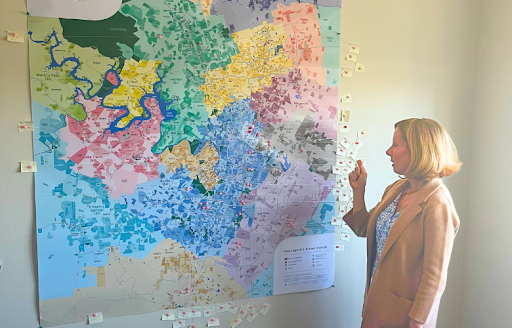Ascension Seton Medical Center Austin’s Breast Care Center receives NAPBC accreditation
Serving the poor and vulnerable: 87% of the center’s patients don’t have insurance and a majority speak Spanish-only
Ascension Seton Medical Center Austin’s (ASMCA) Breast Care Center received its accreditation from the National Accreditation Program for Breast Centers (NAPBC) in September. This achievement makes ASMCA’s Breast Care Center the only accredited center of its kind in Austin.
Under Ascension’s mission to serve the poor and vulnerable, ASMCA is in a unique position to help Central Texans in need. Around 87% of the Center’s breast cancer patients arrive without private insurance. More than 60% are Spanish-speaking only. Achieving the NAPBC accreditation ensures that these women have access to high quality care with specialists across several disciplines coordinating their treatment.
Breast Program Director Kimmie Ellison keeps a map on her office wall with pins marking the zip codes of each current patient in treatment. Ellison said it’s her privilege to serve this vulnerable population.

“We are the only provider of breast care, which includes breast cancer care, to women in our county and surrounding counties who don’t have access to private health insurance or state-funded insurance,” said Ellison. The Center’s social worker and team of nurses help enroll women into various sources of healthcare funding. Texas has the highest rate of uninsured persons under 65 in the nation at 18.8%, according to the U.S. Census Bureau 2022 data.
Because many Central Texas communities are also among the fastest growing in the US, Ellison said the demand for breast cancer treatment grows each year. In 2023, the center received 97 new breast cancer referrals and has already received 64 this calendar year.
The median age for a woman diagnosed with breast cancer at the Breast Care Center is 52, ten years below the national median age. Ellison said the lower median age is a mystery and likely due to many factors. She said the lack of insurance means many patients do not have a primary care physician or access to regular checkups and screenings. Up to 80% of the center’s patients come in after they discover a breast lump or other suspicious symptoms. Some started their breast cancer journey seeking help in the emergency room because they didn’t know where else to turn.
Ellison points to the team of patient navigators – nurses who guide patients through each step of their screening and treatment process – as the strength of the program.
“No other organization has navigation that starts at the time of screening and goes all the way through survivorship,” Ellison said. “Everyone who has a screening mammogram at our center gets access to a navigator who will walk them through all of the necessary steps. That person will not stop until all the right referrals are made, the orders received and a hot hand-off of the patient’s chart is complete.”
One in eight women will receive a breast cancer diagnosis in their lifetime, according to the American Cancer Society. Ellison says every woman is at risk.
“I tell all of the women I see in the clinic that you’re either average risk or high risk,” said Ellison. “No one is at low-risk for breast cancer.”
At Ascension, we encourage all women age 40 and above to schedule an annual screening mammogram for early detection. The American Cancer Society reports a 99% 5-year survival rate for women who detect breast cancer early and in the localized stage.
We are so proud of the care provided by the ASMCA Breast Care Center and the recent accreditation highlights their life-saving work.
Published: October 11th, 2024
